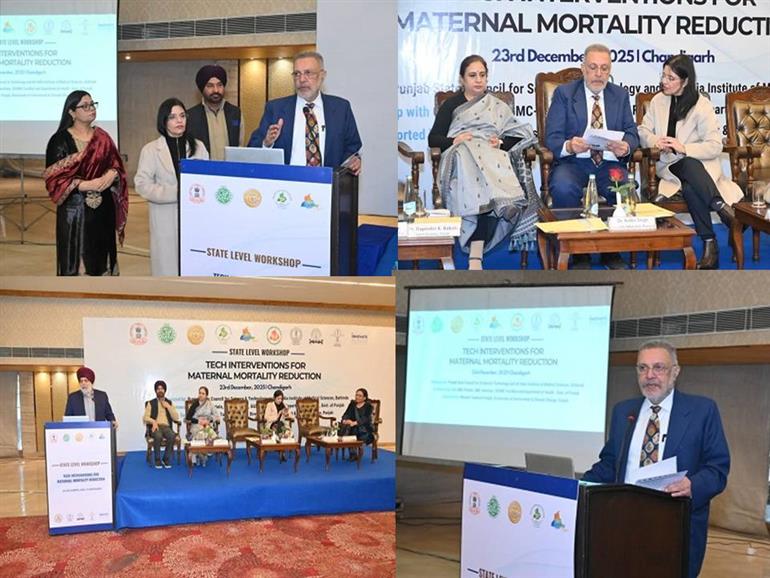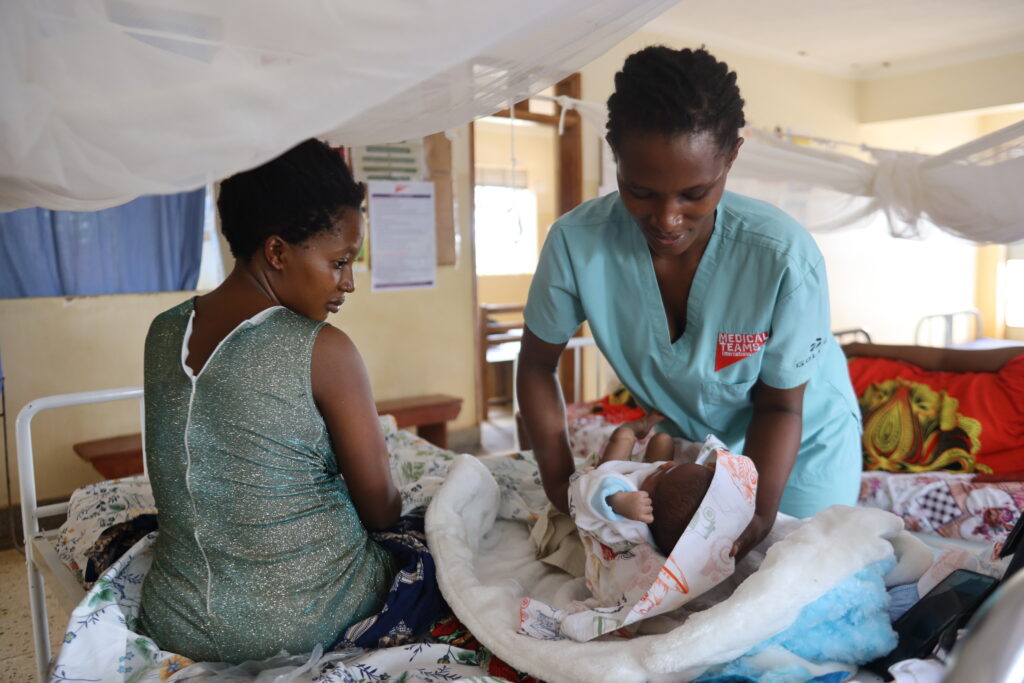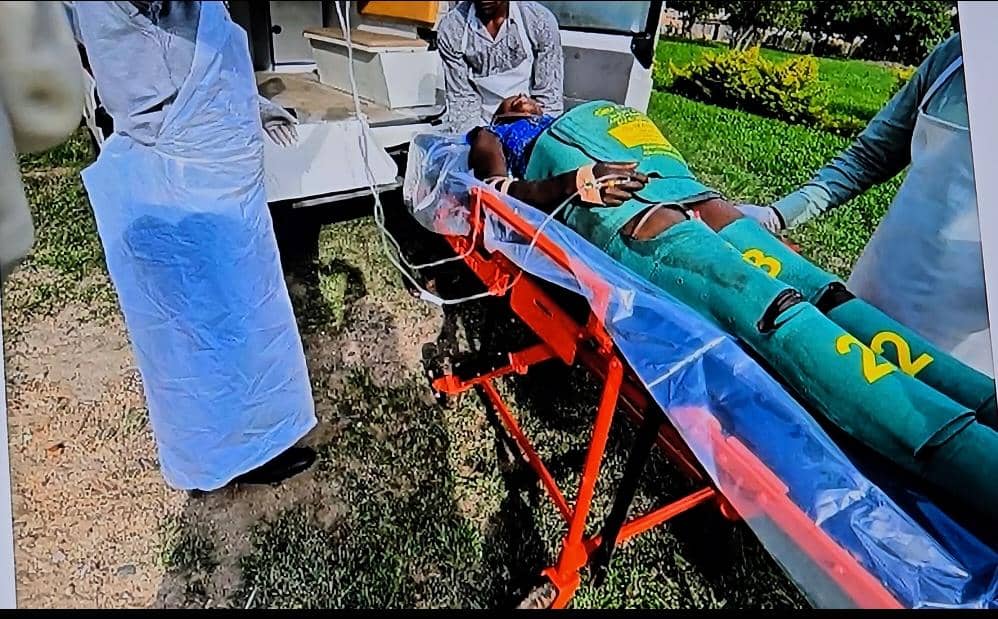Health Minister addresses a state-level workshop on ‘Tech Interventions for Maternal Mortality Reduction’
December 23, 2025
Punjab has announced a statewide scale-up of proven interventions to reduce maternal deaths, expanding the use of NASG and UBT to prevent post-partum hemorrhage. Building on pilots that saved more than 300 women in 12 districts, the initiative will extend these life-saving tools and provider training across government health facilities to improve maternal outcomes statewide.
A Life-Saving Wrap: How a Simple Garment is Changing Maternal Health in Uganda's Refugee Settlements
November 10, 2025
Post-partum hemorrhage drives the majority of maternal deaths in Nakivale and Oruchinga settlements. Medical Teams International, with partners, distributed NASG garments to 45 health facilities, trained 82 providers, and reached over 35,000 women, dramatically improving survival and emergency obstetric care in high-risk refugee settings.
Rotary Donation of Life-Saving Garments Helping Ankole Mothers Survive Post-Natal Bleeding
October 21, 2025
The Rotary Club of Mbarara Ranchers distributed 50 NASG garments across 45 health facilities in Uganda’s Ankole sub-region, equipping midwives and clinical officers to stabilize women experiencing postpartum hemorrhage. The initiative, implemented with Medical Teams International and regional partners, has expanded coverage across 15 districts, enhancing emergency obstetric care and significantly improving maternal survival in rural and remote health centers.
Anti-shock suits saving mothers in Nepal’s remote districts
September 4, 2025
Health workers in rural Nepal are using anti-shock suits to save women experiencing postpartum haemorrhage, with reports of lives saved in districts like Doti. Backed by government funding, 45 districts and all federal hospitals are now equipped with the device, strengthening emergency response in hard-to-reach areas. Officials say the program has already prevented deaths and builds on Nepal’s achievement of reducing maternal mortality by more than 70% since 2000, as the country works toward the 2030 SDG target.
Health care trainees complete emergency obstetric and newborn care training
August 17, 2025
The County Government of Kakamega, in partnership with Lwala Community Alliance, has completed its second Emergency Obstetric and Newborn Care (EmONC) training for health workers from 29 facilities across six sub-counties. The training focused on life-saving practices, including the use of Non-Pneumatic Anti-Shock Garments (NASGs) to manage postpartum hemorrhage, and was supported by donations of NASG kits and educational materials. Trained providers will now champion these skills within their facilities to help achieve the county’s goal of zero maternal and newborn deaths.
Ankole Health Facilities Receive 50 Anti-Shock Garments to Combat Maternal Deaths
June 29, 2025
Fifty Non-Pneumatic Anti-Shock Garments (NASGs) were donated to health facilities across Uganda’s Ankole region by Rotary Club partners and Medical Teams International. The donation aims to reduce maternal deaths from postpartum hemorrhage, which accounts for nearly half of maternal deaths in the region. Each of the over 40 recipient facilities will receive at least one NASG to strengthen emergency obstetric care.
Preventing postpartum deaths in Pakistan
June 7, 2025
In the Pakistan Observer, Dr Ayesha Babar Kawish highlights the urgent need to reduce maternal deaths from postpartum hemorrhage (PPH), which is a leading cause of maternal mortality in the country. The Non-Pneumatic Anti-Shock Garment (NASG) has been successfully used to stabilize women with postpartum hemorrhage (PPH) and is a low-cost, easy-to-use device that buys critical time during transport to care. With WHO endorsement and proven success in similar low-resource settings, the NASG is a vital solution for improving maternal outcomes in Pakistan.
The road to universal health coverage: powering a movement through coalition
May 17, 2025
Lwala Community Alliance, a UCSF Safe Motherhood partner based in Kenya, highlights the success of the CHU4UHC coalition in Kenya, formed by 26 partners to professionalize community health workers (CHWs) and strengthen health systems. Key achievements include securing government commitment to stipend all 100,000 CHWs following advocacy during the 2022 elections. The coalition’s collaborative model integrates policy reform, governance improvements, and digital health innovations to advance universal health coverage. CHU4UHC’s approach provides a replicable framework that emphasizes coalition-building and local ownership to achieve sustainable and equitable health outcomes.
Medics Receive Training to Curb Maternal Mortality in Rural Areas
March 24, 2025
NGO Dandelion Africa ran a five-day training and donated 66 NASGs to help train and equip providers at 32 health facilities in Kenya. Aszed Wendo, the Chief Executive at Dandelion Africa, stated, "Postpartum haemorrhage is the leading cause of maternal deaths, and NASG can prevent those deaths. We hope our donations will go a long way in reducing the number of deaths." These NASGs will help facilities provide stabilizing care to women, particularly those in more rural areas or those served by facilities Level Four and below that previously lacked access to NASGs.
County Promotes Maternal Health Through Partnership
February 1, 2025
Kakamega County has partnered with Lwala Community Alliance to combat postpartum hemorrhage (PPH) by introducing the Non-Pneumatic Anti-Shock Garment (NASG) in 25 health facilities. The initiative includes provider training, data monitoring, and plans to scale countywide. With over 90% of births already occurring in facilities, this evidence-based intervention aims to drive down maternal mortality and strengthen emergency response systems.
Kajiado receives lifesaving equipment to curb maternal deaths
December 4, 2024
In December 2024, Kajiado County, in partnership with Lwala Community Alliance, equipped 25 health facilities with 60 Non‑Pneumatic Anti‑Shock Garments (NASG) and trained providers to manage postpartum hemorrhage (PPH)—a leading cause of maternal death in Kenya. The NASG, a low-cost, lifesaving device, stabilizes women during delays in emergency care, buying up to 48 hours for treatment. This initiative strengthens referral systems and supports Kenya’s progress toward reducing maternal mortality and achieving SDG targets.
Homa Bay County Receives Lifesaving Equipment to Curb Maternal and Infant Deaths
August 14, 2024
Lwala Community Alliance, a Kenyan-led organisation has donated equipment of Kenyan Sh2.66 million to support the county government in the fight against maternal mortality. The equipment has been distributed to 36 health facilities within the county and health workers trained on how to use them. This included a Non-Pneumatic Anti-Shock Garment (NASG), a device that can save women’s lives by reducing blood loss and stabilizing them until treatment is available. Postpartum haemorrhage (bleeding after delivery) is the leading direct cause of maternal deaths in low-resource settings.
UCSF Presents for WHO on the NASG for Postpartum Hemorrhage
August 7, 2024
Presentation by Project Director, Michelle Skaer Therrien as part of the International Childbirth Initiative webinar series: WHO Postpartum Hemorrhage Recommendations & Introduction to the NASG.
Zambia's large-scale evaluation of NASG lays the blueprint for wider adoption
July 4, 2024
Clinton Health Access Initiative and the Zambia Ministry of Health published a study examining the introduction of the NASG into 143 public health facilities in Northern Province, Zambia. The study showed that training led to 92% of healthcare professionals feeling confident in applying the NASG. This research has enabled the Zambian Ministry of Health and CHAI to formulate an operational blueprint for other countries.
UCSF Leads FIGO 2023 Workshop on Postpartum Hemorrhage
October 2023

Professor Suellen Miller, Michelle Skaer Therrien, and Lwala Community Alliance's Carren Siele served as faculty at the FIGO 2023 Congress to teach participants to apply the non-pneumatic antishock garment.
Ibu Robin Lim demonstrates the use of the NASG during disaster response at the International Confederation of Midwives World Congress
June 2023
How Niger halved maternal mortality casued by postpartum hemorrhage
April 28, 2023
Niger's adoption of a treatment protocol according to FIGO's recommendation of misoprostol, NASG, and Uterine Balloon Tamponade (UBT) use has reduced deaths by PPH by more than half. Dr. Zeidou Alassoum, Resident Technical Advisor in Niger for the NGO Health and Develeopment International, shares insights on the success of the interventions.
UCSF Partners with Muso Health to Introduce the NASG in Mali and Côte d’Ivoire
July 21, 2022
UCSF Safe Motherhood partnered with Muso to bring NASG training to providers in Mali and Côte d’Ivoire throughout June 2022. Maimouna Coulibaly, a midwife at the Bankass Referral Health Center (CSREF) and training participant said, "The introduction of the anti-shock clothing means a lot especially in the Bankass area because we are stationed in a remote area so it will help save a lot of lives, a lot of women, so we are very happy to do this training."
Anti-Shock Garment Distributed in Tamil Nadu
January 8, 2016
Tamil Nadu has begun distributing NASGs across public health facilities as part of a broader initiative to reduce maternal mortality from postpartum hemorrhage. The rollout aligns with efforts to strengthen emergency obstetric care through improved labor management, anemia reduction, and provider training at the primary and referral levels.
News Archive
CHAI and partners announce agreement to help save mothers’ lives
April 9, 2015
The Clinton Health Access Initiative (CHAI) and partners announced a major agreement to reduce the cost of the non-pneumatic anti-shock garment (NASG), a life-saving device used to treat postpartum hemorrhage (PPH), a leading cause of maternal death. The agreement lowers the cost by over 75% for public sector buyers in 51 countries, improving access in low-income regions. The NASG, made from durable neoprene, stabilizes women experiencing severe bleeding, buying critical time for transport to medical care. This initiative is a key step in improving maternal health worldwide.
Lifewrap Garment May Save New Mothers From Postpartum Hemorrhage, Greatest Cause Of Death
October 23, 2013
Developed from NASA technology, the Lifewrap—a non-pneumatic anti-shock garment (NASG)—has been shown to reduce maternal deaths from postpartum hemorrhage (PPH) by 54%. UCSF’s Suellen Miller led the research, highlighting the NASG’s effectiveness as a temporizing measure in low-resource settings where delays in transfusion are common. Recognized by PATH and the UN as a top maternal health innovation, the Lifewrap is cost-effective, reusable, and life-saving in the critical window before definitive care.
Garment Saves Mothers from Postpartum Hemorrhage
October 22, 2013
The non-pneumatic anti-shock garment (NASG), adapted by UCSF’s Suellen Miller from NASA technology, is transforming maternal care in low-resource settings by stabilizing women experiencing postpartum hemorrhage (PPH)—the leading cause of maternal death globally. Clinical trials in Africa showed up to a 54% reduction in mortality. The WHO now recommends the NASG, and it’s in use across 16+ countries. Inexpensive, reusable, and easy to apply without advanced training, the NASG is a critical tool for bridging delays in accessing definitive care.
A Low-Cost, Life-Saving Intervention
September 26, 2013
At Chirayinkeezhu Taluk Hospital, a postpartum patient showing signs of obstetric shock—despite no initial PPH—was stabilized using a Non-Pneumatic Anti-Shock Garment (NASG). The intervention, applied just one day after staff training and distribution by the Health Department, likely saved her life. This case underscores the NASG’s value in managing unexpected hypovolemic shock and highlights the impact of timely training and implementation in high-volume facilities.
Rising Stars and Solutions
June 1, 2013
At the 2013 Women Deliver conference, the Non-Pneumatic Anti-Shock Garment (NASG) was recognized as a breakthrough solution for preventing maternal deaths from postpartum hemorrhage—one of the leading global causes of maternal mortality. Originally developed from NASA technology, the NASG has demonstrated up to a 50% reduction in hemorrhage-related deaths in clinical trials across Nigeria, Zimbabwe, and India. Advocates, including UCSF’s Suellen Miller and PATH, continue to scale access in low-resource settings, where the NASG serves as a low-cost, reusable, life-saving intervention that stabilizes patients until definitive care is available.
Zimbabwe: Low Cost Shock Tool On the Cards
May 4, 2013
Zimbabwe’s Ministry of Health is preparing to roll out the Non-Pneumatic Anti-Shock Garment (NASG) as a low-cost first-aid intervention to manage obstetric shock and reduce pregnancy-related deaths. At a national dissemination meeting in Harare, Health Secretary Dr. Gerald Gwinji affirmed the government’s support for evidence-based innovations like the NASG, which is proven to stabilize patients experiencing severe hemorrhage and prevent further deterioration while en route to definitive care.


















